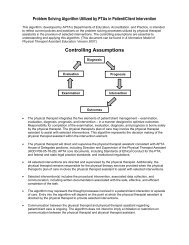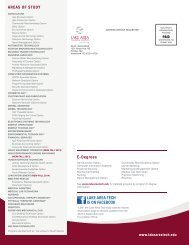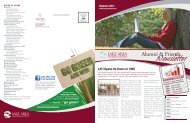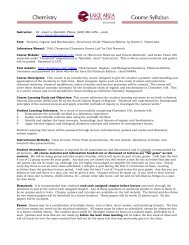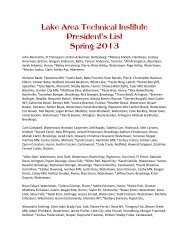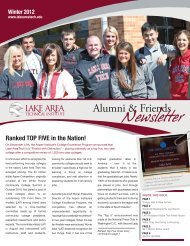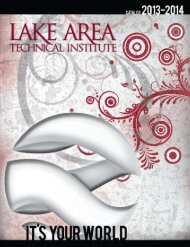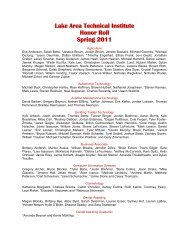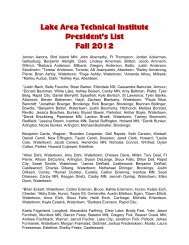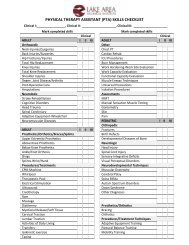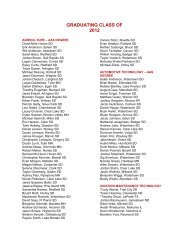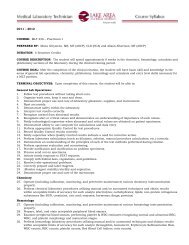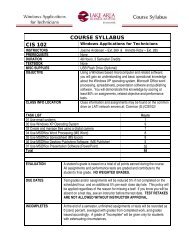Areas Of Study - Lake Area Technical Institute
Areas Of Study - Lake Area Technical Institute
Areas Of Study - Lake Area Technical Institute
You also want an ePaper? Increase the reach of your titles
YUMPU automatically turns print PDFs into web optimized ePapers that Google loves.
PTA 136<br />
PTA 141<br />
PTA 145<br />
PTA 150<br />
PTA 216<br />
PTA 220<br />
PTA 225<br />
PTA 228<br />
PTA 229<br />
therapeutic heat and cold, ultrasound, hydrotherapy,<br />
phototherapy, and intermittent compression pump, and<br />
traction. Students will also be exposed to proper positioning<br />
and draping techniques for treatment to various body<br />
regions. Students will learn basic massage and soft tissue<br />
techniques. This course will also introduce the topics of<br />
universal precautions, sterile techniques, wound care,<br />
burn care, dressings, and bandaging of burns and wounds.<br />
4 credits<br />
ELECTROTHERAPY (2 1/2 weeks)<br />
Includes classroom and lab instruction on the theory and<br />
application of therapeutic electrical current and biofeedback<br />
for pain modulation and neuromuscular facilitation and<br />
re-education as well as the use of electrical stimulation in<br />
combination with other therapeutic agents. 3 credits<br />
CLINICAL AFFILIATION I (6 weeks)<br />
Designated Clinical Instructor from the community-based<br />
physical therapy setting, who has a minimum of two years<br />
of clinical experience and LATI Academic Coordinator of<br />
Clinical Education will supervise student learning in the<br />
clinical setting. 4 credits<br />
THEORIES OF THERAPEUTIC EXERCISE<br />
Includes classroom and laboratory instruction on the theory<br />
and technique of basic therapeutic exercises. Students will<br />
receive instruction in theories, stretching, strengthening and<br />
total joint replacement. 1 1/2 credits<br />
PATHOLOGY FOR THE PTA<br />
Provides students with the basic knowledge or diseases of<br />
the human body. Emphasis will be put on the description,<br />
etiology, signs and symptoms, diagnostic procedures,<br />
treatment, prognosis and prevention of pathologies most<br />
commonly treated in physical therapy. 2 credits<br />
APPLICATIONS IN THERAPEUTIC EXERCISE<br />
Classroom and laboratory instruction on the technique<br />
of basic therapeutic exercise used for the treatment of<br />
musculoskeletal and cardiovascular disorders. 2 credits<br />
MUSCULOSKELETAL DISORDERS<br />
AND TREATMENT<br />
This course will consist of classroom and laboratory<br />
instruction on the management of common musculoskeletal<br />
disorders with emphasis on physical therapy treatment<br />
protocols. This course will also include a review of basic<br />
assessment and treatment procedures. 4 credits<br />
PSYCHOSOCIAL CONSIDERATIONS IN<br />
PATIENT CARE<br />
This course will consist of classroom instruction and<br />
discussion on topics such as therapist/patient/family response<br />
to illness/disability, cultural and age-related considerations,<br />
death and dying, the grieving process and appropriate<br />
interaction between the PTA and the patient/family.<br />
2 credits<br />
NEUROANATOMY AND NEUROLOGICAL<br />
DYSFUNCTION<br />
This course includes classroom instruction in basic<br />
neuroanatomy, review of sensory, motor systems, higher<br />
cognitive processes, neurodevelopmental sequences, reflexes<br />
and autonomic nervous systems. Discussion of neurological<br />
pathology will allow students to recognize signs and<br />
symptoms and etiology of these disorders. 3 credits<br />
HUMAN DEVELOPMENT AND PEDIATRIC<br />
DISORDERS<br />
This course includes classroom instruction on: embryology,<br />
neurodevelopmental sequences, reflexes, critical competencies<br />
and pediatric disability. Students will become familiar with<br />
normal and abnormal development. This course will give<br />
students an opportunity to interact with children and<br />
understand the importance of play. 1 1/2 credits<br />
PTA 231 SPECIAL TOPICS<br />
Includes classroom and laboratory instruction in a variety<br />
of topics considered specialties in the practice of physical<br />
therapy. Students will be exposed to the following: orthotics,<br />
sport bandaging and taping, geriatric disease processes and<br />
PT management, cardiopulmonary disease processes and<br />
PT management and alternative medicine. 2 credits<br />
PTA 242 REHABILITATION PROCEDURES<br />
Classroom and lab instruction on rehab procedures<br />
used in treating neurological disorders such as Multiple<br />
Sclerosis, Parkinson’s disease, brain tumors, cerebellar<br />
disorders, Guillian Barré, peripheral neuropathies,<br />
head injury and spinal cord injury. Amputee<br />
rehabilitation and prosthetics will also be discussed.<br />
4 credits<br />
PTA 245 CLINICAL AFFILIATION II (6 weeks)<br />
This course is a clinical practicum learning experience that<br />
takes place in a community-based physical therapy setting<br />
over a period of six consecutive weeks. It occurs after the<br />
completion of the first and second year of coursework and the<br />
Clinical Affiliation I. The student attends the clinic setting<br />
each day for a full workday. While in the clinic setting, the<br />
student practices physical therapist assistant procedures<br />
necessary for patient care. The clinical instructor provides<br />
opportunities for the student to observe and implement<br />
physical therapist assistant standards of practice.<br />
4 credits<br />
PTA 250 CLINICAL AFFILIATION III (6 weeks)<br />
This course is a clinical practicum learning experience that<br />
takes place in a community-based physical therapy setting<br />
over a period of six consecutive weeks. It occurs after the<br />
completion of the first and second year of coursework and<br />
Clinical Affiliations I and II. The student attends the clinic<br />
setting each day for a full workday. While in the clinic setting,<br />
the student practices physical therapist assistant procedures<br />
necessary for patient care. The clinical instructor provides<br />
opportunities for the students to observe and implement<br />
therapist assistant standards of practice. 4 credits<br />
RBTC 200 BLUEPRINT READING/SOLID MODELING<br />
This course introduces students to reading and interpretation<br />
of industrial drawings as well as an introduction to 3D solid<br />
modeling. 3 credits<br />
RBTC 202 ROBOTIC ENGINEERING<br />
Students will build a robot to perform a task or play a game<br />
using motor controls that include sensors, switches, solenoids,<br />
timers, counters and programmable logic controllers.<br />
3 cred its<br />
RBTC 205 PROGRAMMABLE LOGIC CONTROLLERS<br />
Basic electronic control devices for industrial machines<br />
including interfacing of PLC’s with pneumatics, hydraulics<br />
and sensors. 3 cred its<br />
RBTC 210 MECHANICAL SYSTEMS<br />
Intro to gear ratios, alignment, chain and belt drives,<br />
component operation and installation. 2 credits<br />
RBTC 219 PROGRAMMABLE LOGIC CONTROLLERS<br />
APPLICATIONS<br />
The practical application of basic electronic control<br />
devices. 3 credits<br />
95



